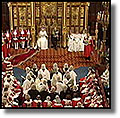
|
|
Queen outlines government agenda
|
| |
|
Packed Legislative Programme
The Queen's Speech outlines proposed pieces of legislation, four further possible Bills and three White Papers.
Bills in the speech include:
- A Crime and Disorder Bill to introduce a range of measures for curbing juvenile crime. The time taken to sentence persistent young offenders is to be halved and new orders will make parents face up to responsibility for their children's misbehaviour. There are also plans for curfews on youngsters and scrapping the assumption that children under 14 are incapable of telling wrong from right.
-
A Firearms Bill which will outlaw all privately-owned handguns, extending the scope of the partial ban on weapons introduced by the previous government after the Dunblane tragedy.
-
An Education Bill to cap the Assisted Places Scheme, phasing out the scheme which subsidises fees at independent schools for children from less well-off families, as well as affirming Labour's commitment to cut class-sizes to 30 for children under seven.
-
An Education Bill to raise standards via measures such as a General Teaching Council to promote and regulate the teaching profession, powers to close failing schools and re-open them with new senior staff and new "improvement teams" to go into failing education authorities.
-
A Finance Bill, to be fleshed out in the Budget, but including funding of the welfare-to-work programme via a windfall tax on privatised utilities' excess profits. The bill will also cut VAT on fuel from 8% to 5%.
-
A Bank of England Bill to hand the Bank operational independence to set interest rates in order to meet Government-set inflation targets.
-
A Referendum (Scotland) Bill to pave the way for a referendum to ask the Scottish people if they want a Scottish Parliament.
-
A Referendum (Wales) Bill to pave the way for a referendum to ask the Welsh people if they want a Welsh assembly.
-
A Lottery Bill to re-distribute around £1 billion of profits over the life-time of a Parliament to health, education and technology projects which otherwise would not be funded.
-
A Low Pay Bill to establish the Low Pay Commission which will come up with a proposed minimum wage level.
-
A Health Bill to take steps to remove the internal market within the NHS to end what Labour call the "two-tier" health service.
-
A Capital Receipts Bill to free up revenue from council house sales to help fund new house building.
-
A Late Payment Bill to penalise larger firms who fail to pay promptly bills from smaller firms.
-
A Data Protection Bill which will offer safeguards to personal privacy.
-
A Regional Development Agencies Bill to set up agencies to act as focal points for job-creation in the regions.
-
A London Local Authority Bill to pave the way for a London Council after a referendum.
Potential Future Legislation
The Queen's Speech may also include some Bills which may not necessarily make it onto the statute book in the next session, including:
-
Legislation incorporating into UK law the European Convention on Human Rights. This lays out basic rights for all citizens, ranging from the right to life to the right to respect for one's private life.
-
A Wireless, Telegraphy and Radio Bill changing the way fees for radio bands are charged, affecting mainly mini-cab radios and mobile phones.
-
A Food Safety Agency Bill to put on to the statute book measures confirmed after completion of a consultation process launched by the Government.
Proposed White Papers
The Queen's Speech will aslo contain a number of White Papers, outlining future government plans. Among them will be;
-
Proposals for a Freedom of Information Bill, with legislation unlikely before the second session of the Parliament.
-
Measures heralding wide-ranging consultation on policies to raise school standards. Under discussion are plans for compulsory home-school contracts, replacing opt-out schools with a new tri-partite school structure and establishing the machinery for balloting parents on the future of grammar schools.
The speech is also expected to signal the Government's intention to refer the question of political party funding to Lord Nolan's Committee on Standards in Public Life.
|

